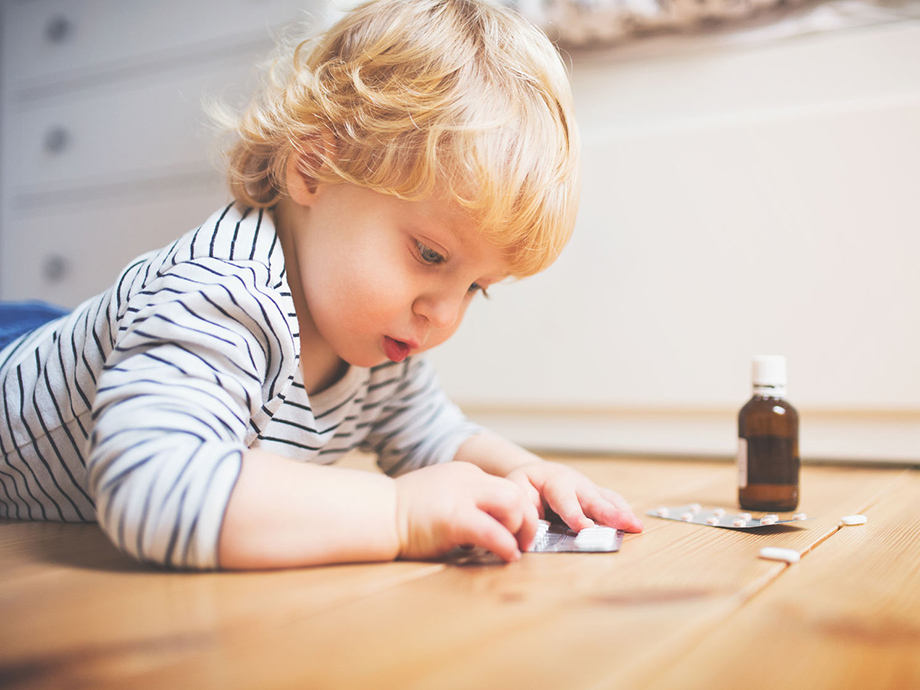Up and Away Offers Tips to Keep Kids Safe From Medications
March 19, 2018, 03:02 pm Michael Devitt – For some people, the first thing that comes to mind when they see March on the calendar is St. Patrick's Day. For others, it's the NCAA basketball tournament. For everyone, though, March signals that spring is here -- and that means spring cleaning isn't that far off.

But there's more to spring cleaning than vacuuming the floor or getting rid of that junk in the garage. According to the Up and Away and Out of Sight campaign, it's also about keeping children and other family members healthy and safe. A March 13 press release from the campaign offers tips on how to do that.
Just in time for National Poison Prevention Week, which takes place March 18-24, Up and Away, the CDC and other organizations are taking steps to remind physicians and patients alike about the importance of storing medications safely to prevent accidental medication exposures.
Background
Research has shown that children younger than age 6 years comprise nearly half of all poison exposures in the United States. Moreover, according to the CDC, about 60,000 young children each year end up in the ER after accidentally ingesting medications left within their reach. Most, if not all, of these exposures and visits are preventable.
Enter the Up and Away campaign, which debuted in 2011. Its goal is to provide family physicians and other health care professionals with resources they can pass on to parents and caregivers on safe medication storage, as well as information on what to do in case of an accidental ingestion.
Story Highlights
The campaign is part of a larger partnership known as the PROTECT (PRevention of Overdoses and Treatment Errors in Children Taskforce) Initiative, a collaborative effort that brings together public health agencies, private sector companies, medical professional organizations -- including the AAFP -- and other stakeholders. Together, these groups have devised a number of recommendations that family physicians can share to keep young children from accidentally consuming medications they shouldn't have access to.
Current recommendations include:
- Placing medications up and away and out of a child's reach and sight;
- Putting medications up and away after each use;
- Making sure the safety caps on medicine bottles are locked;
- Disposing of any expired, unused or unwanted medications properly;
- Teaching children about medication safety;
- Asking family members and visitors to put purses, bags and coats away and out of a child's sight when these items are in the home;
- Being prepared in case of an emergency; and
- Keeping updated contact information, such as the national toll-free poison control hotline at 800-222-1222, on hand.
The AAFP's association with PROTECT and Up and Away also played a role in the Academy's 2011 decision to adopt policy supporting the use of a standardized measurement for liquid medications to prevent unintended medication overdoses in children.
Family Physician Perspective
Daron Gersch, M.D., a family physician in Albany, Minn., chairs the AAFP Commission on Health of the Public and Science's Subcommittee on Public Health Issues. In addition, he serves as the AAFP's representative to the PROTECT initiative.
Gersch said he remembers that during his residency, there was practically no training offered to physicians on how to prevent accidental medication ingestions. He also remembers witnessing the unfortunate consequences of these incidents in the ER setting. As a result, he knows the importance of talking with patients about the dangers of leaving medications within a young child's grasp.
"I believe this continues to be an important topic for childhood safety," Gersch told AAFP News. "I try to remember to talk to my patients about safe storage of medicine and about the disposal of medications that are no longer being used. Most every community now has a place to dispose of old medications, and health care workers should familiarize themselves with where they're at so we can tell patients where to dispose of old, unused medications."
Gersch also emphasized the importance of family physicians using social media to raise awareness about safe medication storage and accidental ingestions. He noted, for example, that the PROTECT initiative has posted links to educational videos on its website, which can be played on monitors in patient waiting rooms.
In addition to the recommendations mentioned above, the Up and Away campaign offers various free materials on its website that can help engage patients about this issue, including a brochure, a poster and a downloadable coloring book, as well as links to other resources.
More From AAFP
FamilyDoctor.org: Safe Medicine Storage for Parents
FamilyDoctor.org: Safe Medicine Storage for Grandparents
FamilyDoctor.org: Safe Medicine Storage for Travel & Children
Additional Resources
FDA: Disposal of Unused Medicines: What You Should Know